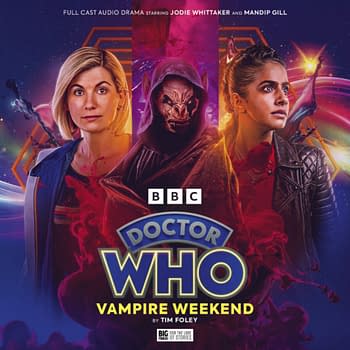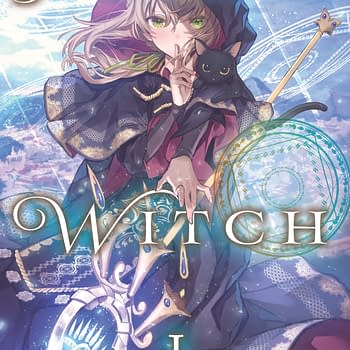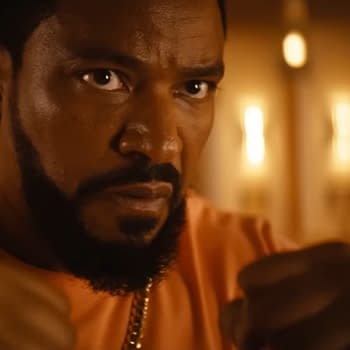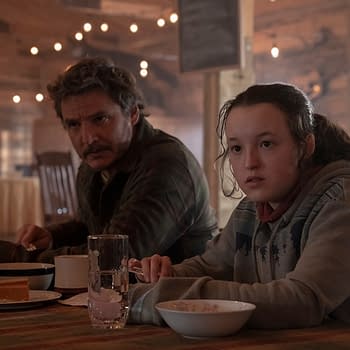Posted in: BBC, TV | Tagged: bbc, bbc archives, ian holm, jrr tolkien, peter jackson, radio drama, The Lord of the Rings
The Lord of Rings: J.R.R. Tolkien's Lost BBC Radio Drama Scripts Found
The first-ever adaptation of J.R.R. Tolkien's The Lord of the Rings was for BBC Radio, and there was more than one. Many people remember the critically-acclaimed 1981 BBC Radio 4 version but there was actually an earlier version that Tolkien scripted back in the 1950s. The audio recordings were believed erased and lost forever, but Tolkien's original scripts have been found.
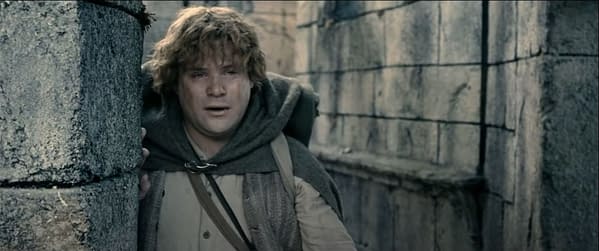
As reported by The Guardian, an Oxford academic delved into the BBC archives and discovered the original scripts for the two series of 12 radio episodes that were broadcast in 1955 and 1956. This has sparked excitement in fellow scholars and hardcore fans.
That first radio adaptation of The Lord of the Rings was dramatised by producer Terence Tiller, whose scribbled notes on the script no doubt recorded his detailed discussions with Tolkien in their correspondence and script meetings. There is even a sheet in Tolkien's handwriting, with red crossings-out, showing his own reworking of a scene during the development and production process that were standard at the BBC in those pre-digital days.
Stuart Lee, a reader in the English faculty at Oxford University, said: "They said the scripts had been lost, but they have survived – the only professional dramatisation of The Lord of the Rings made during his [Tolkein's] lifetime. It was not seen as important by the BBC then. It shows how the reception of the book has changed – minor interest in 1955-56, now a global phenomenon, with Amazon reportedly investing more than $1 billion in the latest TV series."
A New Scholarly Book about The Lord of the Rings
Lee's discovery will feature in a forthcoming new book, The Great Tales Never End: Essays in Memory of Christopher Tolkien, in which academics pay tribute to the scholarship of Tolkien's devoted son and literary executor, who died in 2020. The book, to be published in June by Bodleian Library Publishing, is co-edited by Richard Ovenden, Oxford University's Bodley's librarian, and Catherine McIlwaine, Tolkien archivist at the Bodleian Libraries.
"As fans await the Amazon Prime series based on the Second Age of Middle-earth, here we have Tolkien himself engaging with the earliest adaptation of The Lord of the Rings," said McIlwaine. "Not only did he agree to the adaptation of his book soon after publication, but he was willing to work with the scriptwriters, to abridge the text and adjust the balance of narration and dialogue, so that it fitted the requirements of radio and the limited time available. It's a very exciting and timely discovery."
The first radio series of The Lord of the Rings was broadcast shortly after Tolkien's original book was published in three parts. While the first series covered The Fellowship of the Ring in six episodes, the second series condensed The Two Towers and The Return of the King into the next six episodes and BBC bosses reduced each of them from 45 to 30 minutes, which Tolkien was unhappy about. It was considered disposable light entertainment and trivial at the time. The genre was still looked down upon by the Establishment at the time.
Lee said: "Seventy years on, we would treat it like a sacred text. These scripts reveal that, in the 1950s, they didn't have any inclination of how important a text it would be."
He argued: "Had the books been out longer and become more established, then perhaps the BBC senior managers would have agreed to each episode lasting 45 minutes and even running to three series."
Tolkien, who died in 1973, was instinctively wary of such dramatisations of books. He hated the Disney movie adaptations of fairy tales like Snow White and the Seven Dwarfs that diluted the darker 1812 Brothers Grimm versions. In 1937 he wrote of his "heartfelt loathing" for Disney productions. Lee was surprised that the sheet bearing Tolkien's writing was overlooked until now. While one scholar had noted its existence, it was not fully discussed and Lee is publishing it in his essay for the forthcoming book. It shows Tolkien redrafting a scene where Frodo Baggins, the hobbit who received a magic ring of invisibility, his companion Sam and the warrior Aragorn refer to the evil wraiths as undead beings.
Tolkien gave a description of the wraiths to the narrator, who linked the scenes thus: "At once the shapes became terribly clear. He could see under their black mantles. In their white faces burned merciless eyes…"
Lee said: "Without the freedom allowed to him in the novel, he considered the best way to convey a description of the wraiths, first rather clumsily getting Frodo Baggins to say 'I… I put the ring on. Then the shapes became terribly clear, and I could see under their black cloaks. Their faces were white with cruel bright eyes…' But he rejected this, favouring instead the use of the narrator."
The BBC files have also preserved audience reactions in the 1950s. One listener complained: "If we must occupy the Third Programme with fairytales then let us have Enid Blyton. " The Observer's critic described the dramatisation as "the best light listening for the next five weeks".
It wasn't until 1981 that a more complete radio drama adaptation of The Lord of the Rings was produced by the BBC. That was a 13-hour series that covered all 3 books featured Ian Holm as Frodo and a cast of well-known British actors like Michael Horden and Bill Nighy. Holm would go on to play Bilbo Baggins in Peter Jackson's movie version. The 1981 BBC Radio version is still considered by many fans as the definitive faithful adaptation of the books.
The Great Tales Never End: Essays in Memory of Christopher Tolkien will be published by Bodleian Library Publishing in June 2022.





